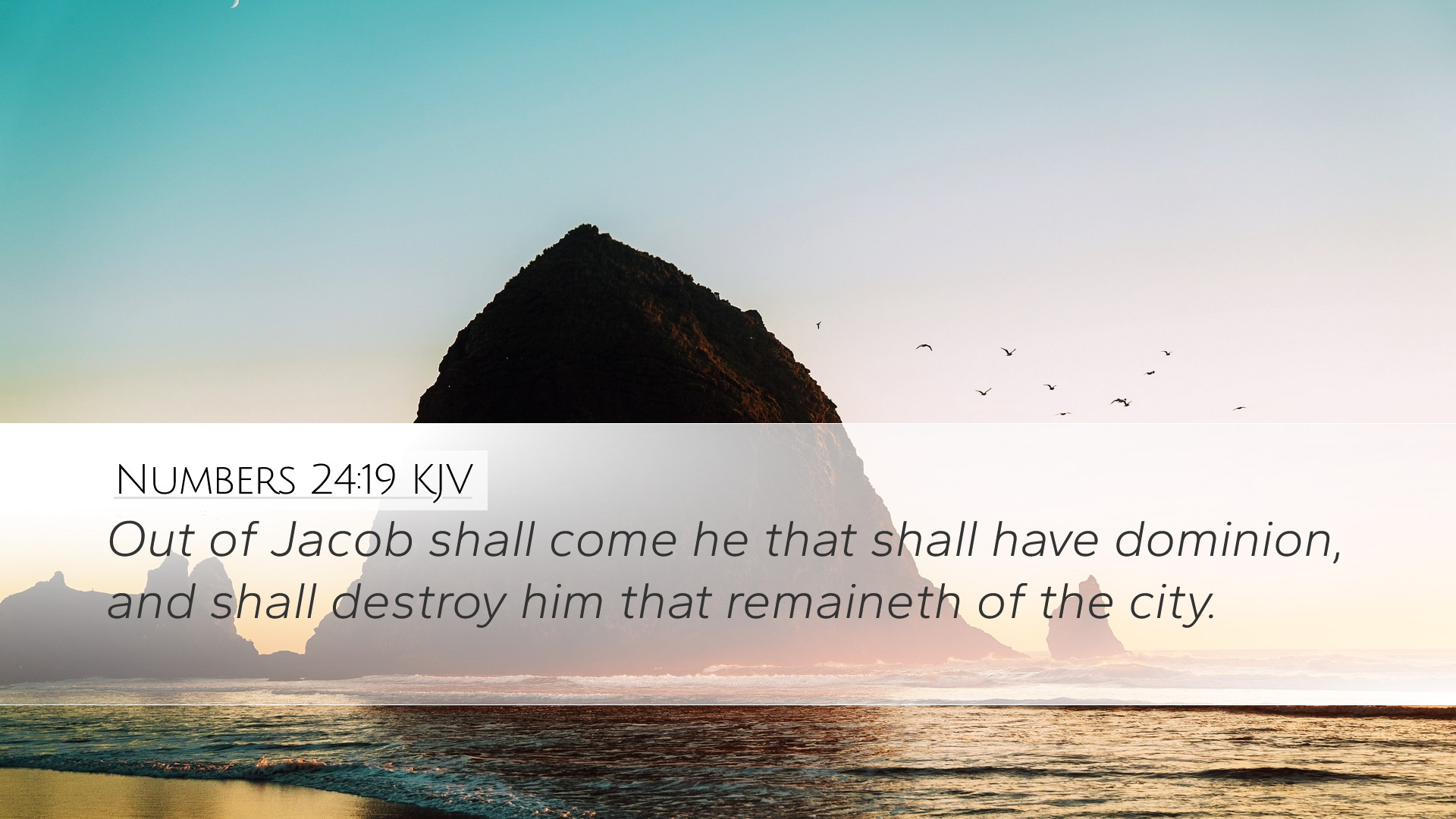Numbers 24:19 - Commentary and Insights
Verse in Context: Numbers 24:19 states, "Out of Jacob shall come he that shall have dominion, and shall destroy him that remaineth of the city." This verse is spoken by Balaam, a non-Israelite prophet, whose oracles reveal truths about God’s plan for Israel and ultimate dominion through the coming Messiah.
General Themes and Interpretations
This verse encapsulates themes of prophecy, dominion, and the inevitable triumph of God's chosen people. It signifies not only the immediate context of Israel's conquest but also alludes to messianic expectations. Various commentaries analyze these dimensions:
-
Balaam's Prophetic Role
Matthew Henry notes that Balaam, despite being a wicked man, was used by God to pronounce blessings rather than curses upon Israel. His prophecies emphasize the divine purpose in the rise of Israel as a nation and highlight the sovereignty of God over all nations.
-
The Coming Ruler
Albert Barnes elaborates that the phrase "he that shall have dominion" refers to a future ruler, which many Christians interpret as a prophecy concerning the Messiah. Barnes draws a parallel to the lineage of David, emphasizing how it ultimately connects to Christ, who fulfills this dominion spiritually and physically.
-
Destruction of Enemies
Adam Clarke remarks that the destruction of the enemies—those symbolizing the forces opposed to God—aligns with the overall biblical theme of God’s victory over opposition. Clarke highlights that this resonates with both historical contexts of Israel's battles and eschatological interpretations of Christ's final victory.
Historical Context
To understand Numbers 24:19 fully, it is essential to grasp its historical backdrop. The Israelites, led by Moses, were on the brink of entering the Promised Land. Balaam's prophecies, under a divine influence, provided a stark contrast to Balak's intentions to curse Israel. This setting underlines God's protective and redemptive plan for His people.
The Nature of Prophecy
This section of Numbers reflects the complexity of prophecy, particularly how God can use even those outside His covenant people to express His will:
-
Divine Sovereignty: God's ability to use Balaam underscores His sovereignty. As Matthew Henry points out, it serves as a reminder that God’s plan cannot be thwarted by human schemes.
-
Messianic Foreshadowing: The text anticipates the coming of the Messiah, a theme that pervades the Old Testament. The idea of a ruler arising from Jacob is foundational for understanding the New Testament proclamation of Jesus as the King of Kings.
Theological Implications
This verse has significant theological implications for Christians and those studying biblical prophecy:
-
God’s Promise of Redemption
The promise of a ruler from Jacob provides assurance of God’s faithfulness. As noted by Albert Barnes, it not only confirms God’s choice of Israel but also points to His ultimate plan for redemption through Jesus Christ.
-
Victory Over Evil
God's declaration through Balaam offers hope of victory over evil. Adam Clarke emphasizes this aspect, as it reassures believers of God’s authority over earthly powers and the ultimate defeat of sin and death.
Practical Applications
Reflecting on Numbers 24:19 encourages believers in their faith and reliance on God's providential care:
-
Faith in God’s Sovereignty
The assurance that God is in control should lead to a strengthened faith. Believers can take comfort in knowing that no situation is beyond God's reach.
-
The Call to Holiness
Understanding the prophetic nature of this verse should inspire Christians to pursue holiness, keeping in mind that they are called to be part of God's victorious plan.
Conclusion
Numbers 24:19 encapsulates a profound message of hope and victory, tying together historical, theological, and practical implications. The insights from renowned public domain commentaries enrich our understanding, reinforcing the underlying message that God’s purposes will prevail, concerning both His people Israel and the ultimate messianic fulfillment in Jesus Christ. As such, it serves as a powerful reminder of the faithful God who reigns, draws people to Himself, and ensures the downfall of opposition.


